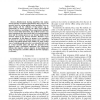Free Online Productivity Tools
i2Speak
i2Symbol
i2OCR
iTex2Img
iWeb2Print
iWeb2Shot
i2Type
iPdf2Split
iPdf2Merge
i2Bopomofo
i2Arabic
i2Style
i2Image
i2PDF
iLatex2Rtf
Sci2ools
134
click to vote
ICMLA
2010
2010
Ensembles of Neural Networks for Robust Reinforcement Learning
Reinforcement learning algorithms that employ neural networks as function approximators have proven to be powerful tools for solving optimal control problems. However, their training and the validation of final policies can be cumbersome as neural networks can suffer from problems like local minima or overfitting. When using iterative methods, such as neural fitted Q-iteration, the problem becomes even more pronounced since the network has to be trained multiple times and the training process in one iteration builds on the network trained in the previous iteration. Therefore errors can accumulate. In this paper we propose to use ensembles of networks to make the learning process more robust and produce near-optimal policies more reliably. We name various ways of combining single networks to an ensemble that results in a final ensemble policy and show the potential of the approach using a benchmark application. Our experiments indicate that majority voting is superior to Q-averaging and...
ICMLA 2010 | Machine Learning | Neural Fitted Q-iteration | Neural Networks | Optimal Control Problems |
Related Content
| Added | 12 Feb 2011 |
| Updated | 12 Feb 2011 |
| Type | Journal |
| Year | 2010 |
| Where | ICMLA |
| Authors | Alexander Hans, Steffen Udluft |
Comments (0)

